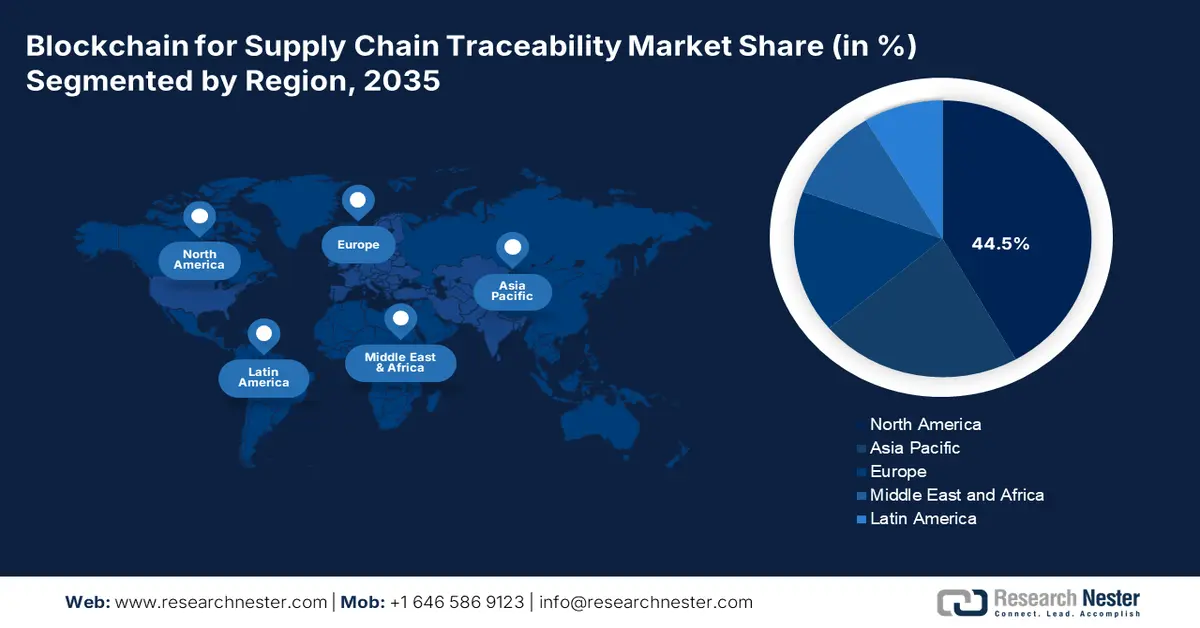Blockchain for Supply Chain Traceability Market Regional Analysis:
North America Market Analysis
North America industry is likely to dominate majority revenue share of 44.5% by 2035, due to several key reasons and growth drivers such as its state-of-the-art technological infrastructure and high digital transformations among other businesses, which enables effortless adoption of such sophisticated technologies as blockchain. Consumers are increasingly inclined towards transparency and accountability in supply chains, while regulatory requirements also continue to propel several blockchain initiatives across industries such as retail, pharmaceutical, and food and beverages.
The presence of key players in the industry coupled with innovative startups creates a competitive landscape that drives development and implementation in North America. Moreover, a majority of investments into research and development coupled with strategic partnerships and collaborations have fostered blockchain for supply chain traceability market growth. Moreover, the disruptions that currently affect supply chains during and beyond the COVID-19 crisis have compelled these companies to invest in blockchain technology for traceability and resilience in their streamlining and optimization of their processes. Thereby, these factors together position North America at the forefront of the market and thus will contribute greatly to the enormous growth observed in the forecast period.
Strong emphasis on innovation and technology adoption supports the U.S. blockchain for supply chain traceability market. Regulatory environment encourages the further use of advanced technologies. in addition, the growing consumer demand for traceable and ethically sourced products propels large investments in research and development by established firms as well as the startups. For instance, in August 2024, in an urgent effort to improve food safety, the FDA recently released a new traceability directive that increases the requirements for record-keeping and reporting while requiring the supply chain to be monitored for specific high-risk foods. The goal is to identify the source of contamination fast and address food safety concerns.
The notable growth driver to fuel the blockchain for supply chain traceability market in Canada is the commitment to rendering transparency and also building customer loyalty. Companies in the market are inclining towards sustainable practices making blockchain technology in the country a vital tool for enhancing the supply chain integrity and efficacy. For instance, Walmart ships about 500,000 shipments yearly to distribution centers and stores across Canada and utilizes both its own trucking fleet as well as third-party carriers.
APAC Market Statistics
The Asia Pacific will be witnessing lucrative growth in blockchain technologies for supply chain traceability. The growth is attributed to imperative factors such as the expanding manufacturing and export base in the region, an increase in consumer demand for greater transparency, and governmental initiatives to pursue digital transformation. The world's largest manufacturing economies are found in APAC countries, including China, Japan, South Korea, and India. The growth of APAC has progressed well in terms of innovation wherein well-established including China, Japan, and South Korea have taken the lead in sectors such as AI, IoT, and 5G.
Blockchains fit well into the general trend of digital transformation where industries look to include such technologies for more efficient, transparent, and safe operations. Blockchain, combined with IoT, can be used to improve visibility in supply chains and track and share data in real time. The region is crucially important in global trade in terms of import and export. Therefore, the cross-border transaction system requires security and transparency management. Thus, blockchain will play a critical role in optimizing supply chains and maintaining the region's competitive edge in global trade.
China is eager to use blockchain technology to fulfill its expanding needs and demands. Thus, it is necessary to look into the current obstacles to the adoption of blockchain technology such as to determine the obstacles that the Chinese Fisheries Supply Chain (FSC) faces in implementing blockchain, create a model to examine the relationships between these obstacles, and create a hierarchy, and lastly to determine the degree to which the identified factors are causally related to one another and classify them appropriately.
India The largest contributors to growth have been the efforts of the government in enhancing digitalization such as Digital India which includes a focus on encouraging the advancement of technologies in logistics and supply chains. With businesses and consumers wanting more visibility into the origin of the products they consume, and into the various subprocesses that make up their supply chains, blockchain technology implementation will simplify processes and create trust, which will lead to tremendous growth in blockchain for supply chain traceability market. For example, in September 2024, the Ministry of Electronics and Information Technology (MeitY) announced the launch of a series of blockchain-based solutions to aid the permission-based applications used in blockchains.


